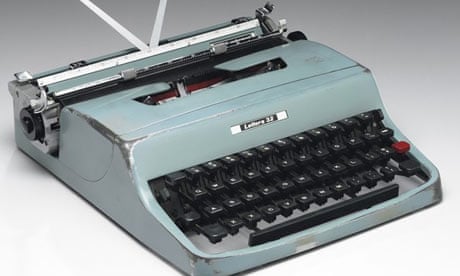Hemingway stood before his to hammer out tales of men and bulls who were noble and brave and doomed, EE Cummings used his to innovate and discombobulate, and now Cormac McCarthy is ending a five-decade partnership that has corralled 5m words by selling his.
However, McCarthy's decision to retire the portable Olivetti typewriter whose ribbons have unloosed such novels as No Country For Old Men and The Road is not wholly of his own choosing.
The machine, which he bought in a Tennessee pawnshop for $50 in 1963, is beginning to betray understandable symptoms of old age and hard usage. If the Lettera 32 had hooves, it would have been dragged out to meet the bolt gun years ago.
"It has never been serviced or cleaned other than blowing out the dust with a service station hose," said the writer. "I have typed on this typewriter every book I have written including three not published. Including all drafts and correspondence, I would put this at about 5m words over a period of 50 years."
When a friend offered to buy the 76-year-old Pulitzer-prizewinner a replacement, McCarthy volunteered to auction his machine and has promised the proceeds to the Santa Fe Institute, a "transdisciplinary research community" dedicated to expanding the boundaries of scientific understanding.
Christie's, which is due to auction the machine – complete with a letter of authentication from McCarthy – in New York on Friday, reckons the typewriter will fetch between $15,000 (£9,000) and $20,000.
Although some might argue that such a sum is a bit steep for a pawnshop purchase, the rare book dealer acting for McCarthy in the sale insists the Olivetti is now almost an icon in its own right.
"When I grasped that some of the most complex, almost otherworldly fiction of the postwar era was composed on such a simple, functional, frail-looking machine, it conferred a sort of talismanic quality to Cormac's typewriter," Glenn Horowitz told the New York Times. "It's as if Mount Rushmore was carved with a Swiss army knife."
McCarthy himself told the paper that it was those very qualities that had won him over. Before heading off to Europe in the early 1960s, he said, he had used a Royal machine – the make beloved of Hemingway – but had been won over by the little Olivetti. "I tried to find the smallest, lightest typewriter I could find."
Despite the advent of the PC, the author remains attached to the sound of the metallic keys, even if others struggle to understand their archaic appeal.
He recalls working at the Santa Fe Institute one summer and attracting the attention of a curious visitor.
"I was in my office clacking away," he told the NYT. "One student peered in and said: 'Excuse me. What is that?'"
McCarthy is not the only writer to stick by his faithful machine.
Will Self, who admits to "fetishising" typewriters, has often extolled the virtues of doing things the old-fashioned way.
"Writing on a manual makes you slower in a good way, I think," he said. "You don't revise as much, you just think more, because you know you're going to have to retype the entire thing. Which is a big stop on just slapping anything down and playing with it."
On McCarthy's side of the Atlantic, Don DeLillo is another famous devotee.
"I need the sound of the keys, the keys of a manual typewriter," he told one interviewer.
"The hammers striking the page. I like to see the words, the sentences, as they take shape.
"It's an aesthetic issue: when I work I have a sculptor's sense of the shape of the words I'm making. I use a machine with larger than average letters: the bigger the better."
McCarthy, whose post-apocalyptic novel The Road has been turned into a film set for release in the UK next year, hopes the sale of the typewriter will go some way to reversing the "not-so-benign neglect" to which the 1950s building that houses the Santa Fe Institute has been subjected.
The writer is now helping to renovate the property and its library. "It's just a great place," he said.
Even if the Olivetti makes only its lower estimate later this week, it will dwarf the $2,750 that one of Hemingway's manual Royals fetched two years ago.
McCarthy himself would doubtless bridle at paying so much for a simple machine.
His generous friend has already tracked down a replacement Olivetti which, miraculously, cost even less than the original.
"I think he paid $11, and the shipping was about $19.95," said McCarthy.
